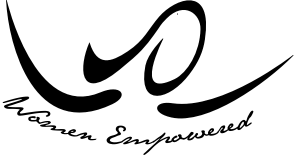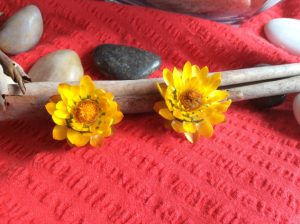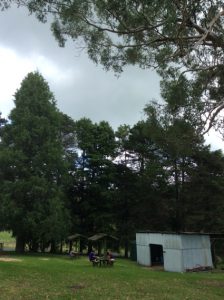Transcript from the podcast “Speak Out Loud: Stories of Strength from the Southern Downs”
SEASON 2: EPISODE 10
GUEST: Carmel and Adam Wooding, Empower Digital
PUBLISHED: 28rd March 2022
[00:00:00] Carmel: I think technology is just a tool to facilitate that connection that we as humans want, you know. We need each other. And I think technology is just a way to, to make that happen. Like we can see in online marketplaces like the Buy From The Bush, people want to support each other. And technology gives us a platform to make that happen so that people from the city can support bushfire recovery or flood recovery or drought, by purchasing handmade item from people that really need their purchases.
[00:00:25] Kathryn: Carmel and Adam Wooding join me on the podcast today to chat about how digital technology can help you to thrive by connecting you with your friends, family and community, as well as how digital technology is helping rural, regional and remote businesses across Australia thrive by connecting them with their customers and their teams. Carmel and Adam established their own business, Empower Digital, during the drought and the bush fires of 2019 in Warwick, Queensland. They also had plans to travel around Australia with their business when the pandemic changed what was possible. Their story reflects how important it is to have goals in your personal and your work or business life. But most importantly, it highlights the value of being flexible in how you work towards your goals. So the themes you’ll hear in this episode encourage you to connect and to be flexible in life and business.
Carmel and Adam, welcome to the podcast. Can you talk to our listeners about what your connection is with the Southern Downs?
[00:01:48] Carmel: Sure. Well, thank you so much for having us Kathryn. So my name’s Carmel Wooding and, um, I actually am a born and bred local Warwick girl, you know, I was raised here, went to school here, moved away after uni and moved to the Gold Coast and met Adam. And, uh, you know, the call of the Southern Downs was too strong. And after our second child was born, back we came.
[00:02:09] Adam: I’d love to first of all, acknowledge the Githabul People, um, the, the Traditional Owners of the land, that we are meeting on today. As Carmel said, I was born on the Gold Coast and before moving out here had absolutely no experience of living in the country at all. I’m a real beach boy. And so after I met Carmel and started coming and visiting Warwick, it was definitely a new experience for me coming out and visiting a country town and so as Carmel said, after our second child was born, we decided to come back and spend some time in Warwick while Carmel was on maternity leave and we had very, very strict plans that we were only gonna come and visit for 12 months. And we were definitely going to be going back to the Gold Coast. We were really sure about that, but I think, um, after I think about two weeks, I think it was, I remember Carmel and I sitting out here where we are now and just thinking, This is just so amazing, such an amazing lifestyle out here. Why would we want to go back to the crowded city? So we decided to stay in Warwick and I’ve just really learned so much and really love living out here now. And I think that for us there’s just so many opportunities and um, it’s just such a amazing way of life for us and our kids now as well. So, I don’t know if I can myself a local yet, but I, I definitely feel a lot more connected to the to this area now.
[00:03:34] Kathryn: And Carmel and Adam in 2019, you had a vision to empower small business owners to develop a stronger digital presence. And at that time, the Southern Downs Region was experiencing pretty severe drought and bushfires. And I recall Carmel, I was collaborating with you to offer some rural and regional small business owners, some education and support that they were needing at that time. What inspired you to start your business at that time? And this was pre COVID as well.
[00:04:05] Carmel: Sure. So, I’m actually an educator, I’m a teacher librarian by trade. And so, education has always really been a passion of mine. Adam has always done a lot in the digital space. So, the businesses that he’s worked for before and particularly in the, in the creation of his father’s business, Adam has always done really amazing things with small businesses in terms of getting them online, having an online store and great digital presence. So I think for us, it was kind of natural that both our passions came together. We decided we didn’t ever want to be gatekeepers and do things for people because we believe so much in empowering people and believe so much that people have the capacity to kind of be the master of their own future. They may just need help with the knowledge and skills to get there.
[00:04:51] Adam: Yeah I think that there wasn’t any conscious decision to start at that particular time, for any reason. Other than that we felt like the time was right for us to start our own thing and have our own business for our family. I had spent a lot of years um, working for my mum and dad’s business which was fantastic. They, they are so generous and, so giving and they always made us feel like we were part of that business, but we, we just felt like it was time for us to go out on our own and, and have our own thing for our family. So that’s the reason that we started at around that time.
[00:05:23] Carmel: And to be honest, Kathryn I think, um, you know, you did have a part to play in that because the opportunity came at that time for those local businesses to get support. And I think that was a real moment for Adam and I to go, Well, the need is out there for somebody to be doing this work. And I guess we were in a place where we were able to offer that to people as well.
[00:05:41] Kathryn: I also recall that at that time you had some plans to travel across Australia and that you were hoping to spend 2020 doing quite a bit of travelling. What impact did the COVID 19 pandemic have on your plans?
[00:05:56] Adam: You’re exactly right. We couldn’t have chosen a worse year to embark on a trip around Australia. No one could have foreseen what that year was going to bring but in terms of the impact for us, so we had planned to continue with our business while we were travelling. I remember that when the pandemic hit, we had about four or five projects lined up that we were planning on working on while we were travelling and everything, all those businesses, pulled out of those projects. So, at which we completely understand because it was such a turbulent time and no one knew what was going to happen. And um, we completely understand that those businesses just needed to put those projects on hold. But it was really stressful for us because all of our work just fell through and we had rented our house out so we didn’t have anywhere to come back to. So we were travelling but we had lost all of our projects. There was a couple of weeks there where it was, I found it really stressful, I think Carmel was handled it a bit better than I did, but, um, it was a really stressful time when that all started. But we fortunately made some changes to our business and started to offer some webinars and um, all kinds of different things like that. And really quickly, our business went in a little bit of a different direction and, and we were very fortunate to make new partnerships with other organisations and start focusing on helping businesses who needed to transition to online sales really quickly to make that transition. Then found a whole new market and are our business has gone into a totally different direction. That’s what we’re focusing on now.
[00:07:26] Carmel: Yeah, so, um, the plan for 2020 was to travel around Australia in a caravan with three children. Our business plan at that point was to run workshops in small regional towns and do a lot of in-person work to be honest because Adam and I are both very passionate about relationships, and very passionate about meeting people where they’re at. So when COVID hit, um, we did return to Warwick. It was about March. So we’d been on the road for about two months. And I think just the uncertainty, you really want to be close to home when, when you’re faced with that level of uncertainty. As Adam mentioned, we did, you know, have to rethink things, Well, can we make that personal connection through online meetings? And of course, we now know that we’re in the era of Zoom and Google Meet and all of those kinds of platforms that make that connection really easy. So, you know, we stayed in Warwick we got our business back on track. We kind of felt a bit more confident in the world and then we were really lucky. We were able to take off again about August, and managed to get five months of caravaning and working on the road in, um, where we got to go through the Northern Territory, did the entire coast of South Australia and the Victorian coast to Geelong before we had to come home and settle back into reality.
[00:08:31] Kathryn: So lots of adjustment and adaptation of the business but also of your own personal and family plans for travel.
[00:08:39] Carmel: Yeah, absolutely. Absolutely. And our family dynamic and all of those kinds of expectations as well.
[00:08:46] Kathryn: Were there any surprising benefits for yourself, for your family or for your business through all of that?
[00:08:52] Carmel: Well, as Adam mentioned, COVID actually had quite a silver lining for our business because we found very quickly that what we were able to offer people was really beneficial and value adding to those businesses. People needed to get their businesses online because people just weren’t out to purchase things in bricks and mortar stores. So the services that we offered were really in demand. So COVID actually, even though our business did go in a completely different direction, it’s actually a really solid direction for us. And, really a way of working that we’re really passionate about and something that we, we actually really love. And in terms of our family, I think it taught us all to be a lot more flexible, taught us to be a bit more resilient I guess. You’ve got to see the silver lining in things, you know. COVID’s been a really hard time for lots and lots of people. And I don’t ever want to downplay that at all, but I think for us and for our family and for our business, we’ve actually come through COVID feeling confident that, that our business has grown and we’ve been able to help other businesses as well.
[00:09:48] Kathryn: Connection to community and to each other is one of the key characteristics of a healthy and a resilient community. And we’re seeing that from the research that’s coming out of the bushfire recovery studies and so forth. Throughout the pandemic businesses and individuals have really searched for solutions to this problem of isolation and feeling disconnected and the issue of distance. And yet people who have been living and working in rural areas and regional communities are really used to dealing with these issues of distance and connection. How is technology, because that’s the industry that you’re working in, how is technology helping communities, including Aboriginal owned businesses to connect with each other and to thrive?
[00:10:38] Adam: I think that technology is playing a huge part in all those things that you mentioned. So I think that there’s so many different aspects that technology is helping in. So I think first of all, the ability for business in those communities to sell their products to either domestic um Australia-wide market or international market. So there’s amazing platforms that make it so easy for those businesses in, in those rural and um remote communities to be able to reach a global market, to be able to create a following and create an awareness of their business and what they have to offer and to be able to then sell their, products and then bring income into their local communities. So I think that technology is playing a huge part in businesses, in um regional and, um, and remote areas. And I think also the ability for people in those communities to communicate and connect to other communities or, um, other relatives or people that are in different areas by being able to have virtual meetings which I think are so powerful. And with our business, we have formed relationships with people in communities all over Australia which is just incredible and and we would definitely not be able to do that without those digital tools.
[00:11:55] Carmel: Yeah, I agree. And I think, just a couple of things on that, Kathryn. So firstly, you know, I think technology is just a tool to facilitate that connection that we as humans want, you know. We need each other. And I think technology is just a way to, to make that happen. Like we can see in online marketplaces like the Buy From The Bush, people want to support each other. And technology gives us a platform to make that happen so that people from the city can support bushfire recovery or flood recovery or drought, by purchasing handmade item from people that really need their purchases, not just buying them online from Amazon or whatever. The other thing I think that is important to note is while technology is amazing, we need to be aware that we’re not all at the same level of access. When we were travelling around Australia in our caravan, it became really apparent to us. Even just, you know, we had our mobile phones and, and all of that kind of, technology. However, there were places that we went that technology just wasn’t available. There wasn’t an internet connection. We couldn’t stay there. We heard a really interesting point as we were travelling. There is an indigenous community, kind of on the Northern Territory South Australian border who had no, no internet, they had no phone towers and it wasn’t until the police needed to set up the COVID checkpoints between the states that they went Oh, well, there’s no internet here. We better get some phone towers put in. So that facilitated that community being able to access technology. So I think we do need to remember that we are really blessed. Even though we’re in regional Queensland, there’s lots of places in Australia that don’t have the access to use this technology to have that connection that we have.
[00:13:29] Kathryn: So it sounds like what you’re saying is these technologies can be wonderful tools for us to connect. Accessibility can be an issue for some people. Is there anything else that you would like to share with us around digital technology and how that can help or perhaps where it’s not helping individuals to connect with each other or for communities and businesses to connect with each other?
[00:13:53] Carmel: I think for me, one of the things that really has become apparent in our business is we do have quite a number of people and look a higher number of people in regional and rural areas who just think technology is not for me. I’m too old. I’m too old school. I didn’t have the opportunity to use it in the past. It’s too hard. And one of the most delightful things about our business is seeing somebody who says in our first meeting, Oh look I’m not tech savvy, go on to run a successful e-commerce store or to have a successful presence on social media. And I just really encourage everybody that there is no such thing as I’m not tech savvy. Everything in life is a learning and technology is no different. And I think there’s just so many potential benefits, particularly for business owners, to just give it a go, dip your toe itn the water. Like you can’t break it. It’ll be fine.
[00:14:45] Kathryn: Because that is a big fear, isn’t it? That if I touch something or press that button, it’s going to break.
[00:14:50] Carmel: That’s exactly right.
[00:14:52] Adam: We’re just so fortunate to have been part of so many incredible stories and so many incredible businesses. So we’re very fortunate to work with an amazing, amazing, organisation that’s based up in East Arnhem Land. And, it’s just this incredible community that has a, has a natural spring that’s on their land. And they are just doing really innovative things. So that they’re bottling their water and selling that online Australia-wide to generate some income for their community so that they can employ teachers and build more facilities. So that’s been an incredible project that we’ve been part of. And so many other businesses around Australia in, in really rural and remote places that have used technology to transform their lives and transform their communities. So, I think technology is a really positive thing and, and has huge potential for such a big impact on rural and remote communities in Australia.
[00:15:50] Carmel: And Kathryn you mentioned about, you know, were there any negative things that I see about technology. So of course I’m an educator. I’m in the education field. And of course, I think it’s just always important for no matter who you are, no matter what age to just maintain that information literacy and remember that everything you see on Facebook, isn’t the truth. So, you know, social media and particularly with our young people, you know, there’s a lot of comparing yourself to others. There’s a lot of, What am I doing wrong in my life because their life looks so good. And it’s in the business field as well, not just in individual life. But I think again, let’s just, let’s just remember that everyone has their bad days, they just don’t post about those days.
[00:16:26] Adam: Yeah I think that you just remind me of another negative aspect as well is, which is really, really bad at the moment is people who are trying to take over other people’s social media accounts and that sort of stuff by gaining access because people have, maybe really poor passwords or not very good security measures in place. So I think we’ve come across a couple of things very recently where, because people haven’t set up very good passwords or are maybe using the same password for multiple accounts, that sort of stuff, that either their bank accounts or their social media accounts or business systems have been broken into. And so that’s caused huge problems for those businesses. So I think, that’s just another area that we come across fairly often that I think business owners need to really be making sure that they have really good passwords and really good security measures in place.
[00:17:17] Kathryn: Thanks Adam. I was going to ask do you have some suggestions on how we can manage some of those challenges with technology? Because just like when COVID came and you had to adjust and adapt and flex your plans and find solutions to those problems that you were having, we can also look at some of these other challenges we have in life like the downside of technology. How can we see our way around that? How can we flex or adapt or adjust what we’re doing to reduce the challenge that we have in that area?
[00:17:50] Adam: Yeah, I think just some practical tools that people can use. So I think that first of all businesses need to just make sure that they are keeping all of their software up to date, making sure that they’re using the latest versions of all the different apps and programs that they use. I think that it’s extremely important that businesses use a password manager to manage all their passwords. I know that can be a little bit of a process to get that set up but it’s definitely worth the time and effort to do that. It can make a very big difference. And by using a password manager, make sure that you are using a different password on every different account that you have. And I think turning on two-step authentication wherever possible is also really worthwhile to do that too. And I think just being really careful about, um, about what links that you click on and who you share sensitive information with as well is really important.
[00:18:51] Kathryn: Adam, you mentioned an organisation that you’d worked with in East Arnhem Land, helping that organisation to develop their online presence and that there were so many benefits for that organisation in being able to do that. Reflecting on that process of being involved with some of those more remote communities, how does that feel to know that you’re part of facilitating their connection with the wider world?
[00:19:20] Carmel: Kathryn that was actually a community in East Arnhem Land. And they created this business called Knowledge Water. Their community is steeped in education, but they have a transient population. So their Homeland school is always under threat of being closed. So they kind of just went, Well, what can we do? How can we change this outcome for our children? But they didn’t want their children going to school in the nearest town four hours away because they were worried about the things that kids could get up to. They really wanted them on Country. And so yes, they just developed this plan to bottle in a sustainable way, their natural spring water and sell that and use the profits from that to then, um, long-term they hope to bottle it onsite. At present it’s not. But you know, they are educating teachers from their community to become educators in the community at their local Homeland school. And think to be part of that really did show us the power of technology because these guys are really working for their own self-determination, the ability to control their own future. Um, and so many communities unfortunately do feel powerless when their young ones have to move away to get work because there is nothing on Country for them to do. And I think really for us, the ability to be involved in that project was super affirming. It was never just a job for us, you know, we’re still connected to that organisation. We plan to work with them in an ongoing capacity. We rejoice at their successes. It’s just, um, you know, I think that’s how we work. We really do get involved with the businesses because we care about their outcomes.
[00:20:46] Kathryn: That’s really beautiful Carmel. And I’m thinking too, that the business that you’ve set up for yourselves here in a regional part of Queensland, because of technology, you’re actually able to reach out to some of these more remote communities who also are now becoming more connected and being able to be part of their world, part of their community, but from a distance.
[00:21:11] Adam: Definitely. It still blows us away every day that we’re able to run our business in a regional town and connect with all these incredible organisations and businesses and communities all around Australia and do that from our home office. And we wouldn’t be able to do that without technology. And think that it was a a really good time for us to start our business. COVID has made it more normal for remote meetings to be just a part of everyday life. And I think that that has actually been a real, a really positive thing for our business because now, we can just continue to make those connections with remote businesses using technology.
[00:21:49] Kathryn: And whilst you’re building your own thriving business, supporting other businesses and other organisations and communities to thrive as well. Adam and Carmel, what’s the best way for people to contact you?
[00:22:02] Carmel: I think probably by our website. Our online presence is www.empowerdigital.com.au but we’re also on Facebook and LinkedIn, Instagram, all of the socials.
[00:22:13] Kathryn: Thanks for listening to the Speak Out Loud Stories of Strength podcast with me, Kathryn Walton. I hope this episode inspires you to get involved and to get connected with your community. You can find the transcript and any links mentioned in this episode, in the show notes and please share the podcast with your friends.
We acknowledge and pay respect to the past, present and future Traditional Custodians and Elders of this nation and the continuation of cultural, spiritual, and educational practices of Aboriginal and Torres Strait Islander peoples. Series Two of this podcast has been jointly funded under the Commonwealth and State Disaster Recovery Funding Arrangements 2018.
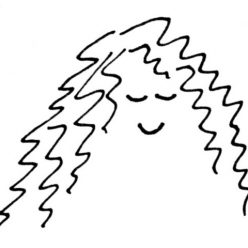
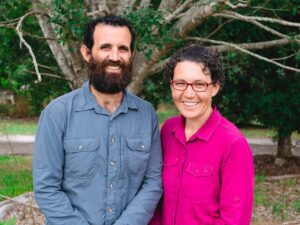
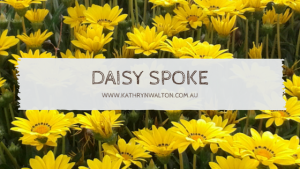
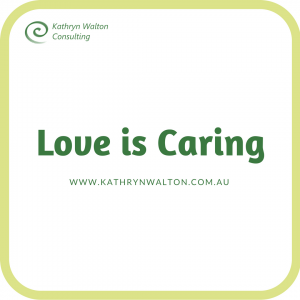
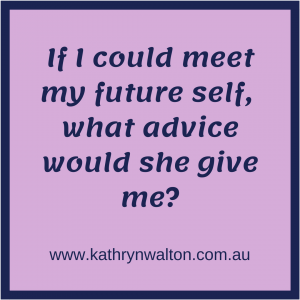
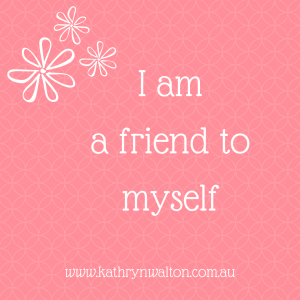 The way we think is closely related to the way we have been socialised when were younger, with the added layer of personality thrown in. So it’s no surprise that women often share certain beliefs, assumptions and thinking patterns related to self-care – it’s selfish to do something for myself; people will think I’m selfish / not coping; time and money should be spent on something or someone else who needs it more than me; I don’t have enough time or energy; I should just soldier on like everyone else does …..
The way we think is closely related to the way we have been socialised when were younger, with the added layer of personality thrown in. So it’s no surprise that women often share certain beliefs, assumptions and thinking patterns related to self-care – it’s selfish to do something for myself; people will think I’m selfish / not coping; time and money should be spent on something or someone else who needs it more than me; I don’t have enough time or energy; I should just soldier on like everyone else does …..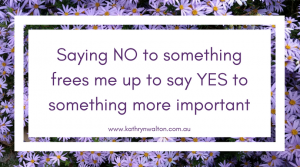

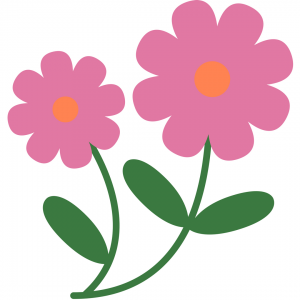 Click here to read my last blog post
Click here to read my last blog post 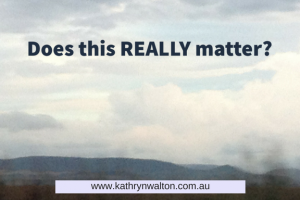
 example of mine was
example of mine was 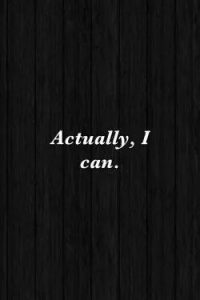
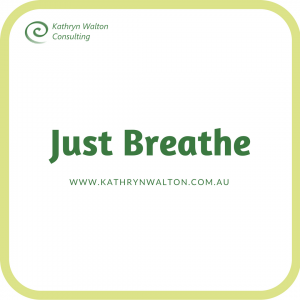 You can collect them from songs, poems, books and social media in addition to listening to your own inner wisdom. Write them on sticky notes, in a journal or diary, print out visual reminders to stick around your home or workplace, or even use them as screen savers and wallpapers on your electronic devices. Some examples include “Just do it”, “One drop raises the ocean”, “Keep it simple”, “Just breathe”, “Stand tall”.
You can collect them from songs, poems, books and social media in addition to listening to your own inner wisdom. Write them on sticky notes, in a journal or diary, print out visual reminders to stick around your home or workplace, or even use them as screen savers and wallpapers on your electronic devices. Some examples include “Just do it”, “One drop raises the ocean”, “Keep it simple”, “Just breathe”, “Stand tall”.
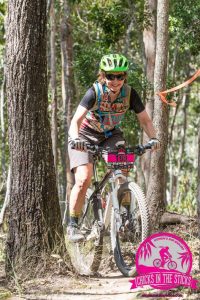 lying on the beach, your stresses trickling away into the sand beneath you) or to help you progress towards a goal (eg visualise yourself speaking in front of an audience, feeling confident, upright posture, smiling, relaxed). When I’m feeling nervous about riding my bike on a particular section of track, I stop for a few moments and picture myself riding it the way I want it to go, as if I’m watching a short video of myself successfully negotiating that section. It truly is a powerful mind-based strategy and one you can use in every area of your life.
lying on the beach, your stresses trickling away into the sand beneath you) or to help you progress towards a goal (eg visualise yourself speaking in front of an audience, feeling confident, upright posture, smiling, relaxed). When I’m feeling nervous about riding my bike on a particular section of track, I stop for a few moments and picture myself riding it the way I want it to go, as if I’m watching a short video of myself successfully negotiating that section. It truly is a powerful mind-based strategy and one you can use in every area of your life.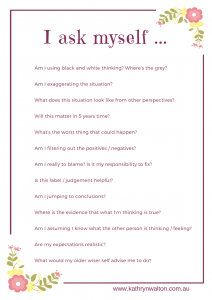 the mix. And to help you keep your strategies in play, I’ve created a free printable for you. “I ask myself …” is a beautiful keepsake of the helpful questions listed above. You can
the mix. And to help you keep your strategies in play, I’ve created a free printable for you. “I ask myself …” is a beautiful keepsake of the helpful questions listed above. You can 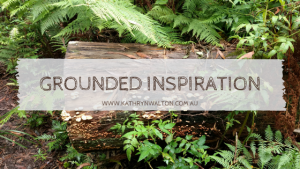
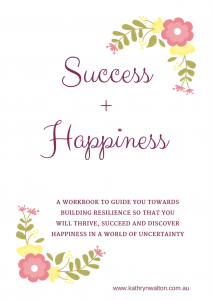 I have an EXCITING OFFER for you!
I have an EXCITING OFFER for you!

 Kathryn Walton shares information and reflections in Daisy Spoke that connect, inspire and self-empower women to make healthy choices for themselves.
Kathryn Walton shares information and reflections in Daisy Spoke that connect, inspire and self-empower women to make healthy choices for themselves.